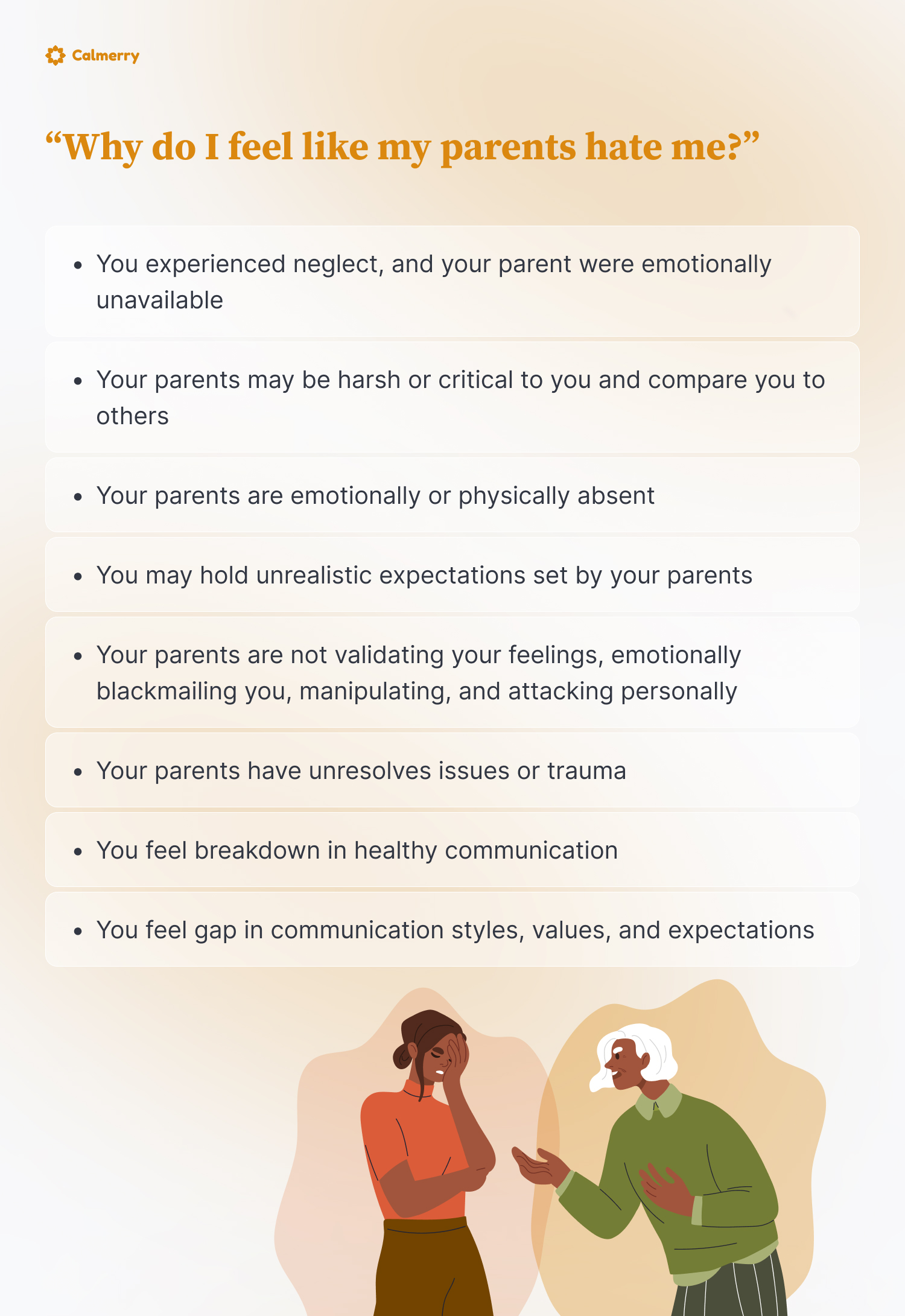Unloved Adult Child: Why Do I Feel Like My Parents Hate Me?

In this article
The parent-child relationship is one of the most important connections in a person’s life. However, for some adult children, this connection becomes fraught with feelings of hate or dislike, leading them to ask the painful question: “Why do my parents hate me?“
As we grow older and become adults, the relationship with our parents changes – both in a practical sense as we move out or on with our adult lives but also in an emotional sense.
We now no longer depend on them for emotional or financial support. What now remains is the core of the relationship – laid bare before us.
It’s during this time that we start to take a closer look at the dynamic we have with our parents and question the things that don’t feel right to us. This can happen when we first leave home, as we start our own families or even later in life.
This article explores the complex emotional landscape of adult children who feel unloved or disliked by their parents. We will look at possible reasons for this stemming from both the child and parents’ perspective and offer insight into understanding your feelings and how to move forward.
Do my parents hate me? Why do I feel this way?
Let’s explore some of the reasons why you may feel dislike or a lack of love from your parents. As you read through these, take time to reflect on how these may have shaped the dynamic between you and your parents and what feelings these bring up for you.
You may want to jot things down in a notebook or your journal. In the next section, we’ll offer advice and support on how you can heal and move forward.

1. Neglect or lack of support
As children, we need unconditional support and affection from our parents. This allows us to feel safe, develop a strong bond with our family and flourish. If love felt conditional and based on achievements or expectations, this may come in the way of a healthy relationship with our parents.
Neglect may also come in different forms as parents may be physically present but emotionally unavailable. When we feel our basic emotional or material needs are unmet, it can lead to a profound sense of rejection.
As adults, we may still want to seek that unconditional love and approval and continue to yearn for it. This becomes all the more highlighted when we are independent and have the chance to reflect back on how we feel about our parents.
– Dr. Bibi Shah, PhD., LMHC
It may also come into view when we become parents ourselves.
2. Harsh criticism or comparison
Children internalize what they hear and feel. If the emotional climate at home contains harsh or critical words, a child begins to believe this about themselves.
Parents, consciously or unconsciously, may be harsh or critical to their children. Such actions can result in feelings of inadequacy, worthlessness, and the belief that they are unlovable.
Constant negative feedback can lower self-esteem and contribute to the perception of parental hatred.
Parents may also compare their child to others (both intentionally and unintentionally), which can lead to feelings of low self-worth and doubt. If this continues, it can shape a child’s behavior and personality.
It may make us strive for extrinsic perfection and approval rather than our own personal goals or intrinsic motivation. We may also become overly critical of ourselves as adults.
3. Emotional or physical absence
Children need warm, emotionally responsive and physically present parents in order to develop optimally. Key child development milestones such as emotion regulation, empathy, and self-esteem depend on this.
Sometimes a parent may have been physically present but emotionally unavailable which can also negatively affect the parent-child relationship.
As adults we, may then reflect back on the time spent with a parent and realize it was less than perfect. We then can’t help but wonder why things have turned out the way they have.
This may be a painful realization for an adult child as they deal with the relationship. This can also lead to feelings of abandonment and create a void in the relationship.
4. Unrealistic expectations
Parents may unknowingly contribute to their child’s perception of being unloved by imposing unrealistic expectations. While having expectations for a child’s behavior and achievements is natural, setting standards that are unattainable can lead to frustration and a sense of failure.
Children may interpret these expectations as conditional love, believing that they are only valued when they meet or exceed their parents’ standards. This can create immense pressure and anxiety. It fosters a belief that their parents will only love them if they conform to these ideals.
As an adult, it’s also important to evaluate whether we, ourselves, may have any unrealistic expectations from our parents that we are holding them, too. This can create a strained relationship where we want something that they cannot offer.
– Dr. Bibi Shah, PhD., LMHC
5. Manipulative or controlling behaviors
Toxic parent may exhibit manipulative or controlling behaviors, attempting to shape their children’s lives according to their desires. This can lead to a sense of suffocation and a feeling that one’s autonomy is constantly under threat. It fosters resentment and the belief that their parents don’t like them for who they are.
Some examples of such behaviors include not validating their child’s feelings, emotional blackmail, emotional manipulation, and personal attacks.
6. Barriers to good communication
Effective communication is the key to any healthy relationship. When communication breaks down between parents and adult children, misunderstandings can arise, fueling the perception of hatred.
So while it may seem like your parents hate you, it may be due to a breakdown in healthy communication.
Barriers to good communication may include generational differences, unresolved issues that have not been discussed, or simply a lack of openness.
Some important things to consider
It’s important to note that sometimes what is perceived as hate or dislike may be a result of miscommunication, generational differences, or unresolved issues of the parents themselves.
Consider taking a closer look at these perspectives while acknowledging your own feelings.
Miscommunication
A lack of good communication can cause a misunderstanding in any relationship. Often, we listen to respond, and not to understand.
Working on our communication skills, both verbal and non-verbal can help bridge the communication gap and build a stronger relationship with our parents.
Generational differences
Our parents were raised in a different time which can lead to generational differences. These can contribute to a gap in communication styles, values, and expectations, fostering disagreements that may be misinterpreted as dislike.
It’s important to recognize and address these as they arise. There may be other sources of tension in the relationship such as disagreement over life choices. [1] Streep, P. (2022, July 30). 1. The assumption of a quid pro quo. Psychology Today. https://www.psychologytoday.com/6-sources-tension-between-adult-children-and-their-parents
Unresolved issues or trauma
Unresolved issues or trauma in our parents’ lives can cast a shadow over their ability to express love effectively. It can also come in the way of optimal parenting.
These issues, if not resolved, can lead to a generational cycle of trauma that needs to be broken.
What should I do if I feel like my parents hate me?
This section offers some practical advice on how to move towards a better relationship with your parents as well as healing and growth for yourself.
Have an open and honest conversation
Approaching your parents for an open and honest conversation can be challenging but is often a necessary step. Express your feelings calmly, focusing on your emotions rather than placing blame.
Seek to understand their perspective and be open to the possibility that there may be misunderstandings or unaddressed issues.
Build emotional resilience
Emotional resilience is your ability to cope with and respond to stressful situations. This is important when navigating difficult emotions and repairing a relationship.
You can build emotional resilience by recognizing and managing your emotions in a healthy way.
Research on emotional resilience has shown that it can be built by engaging in activities that bring you joy, surround yourself with a supportive network of friends and consider mindfulness, journalling, or therapy to build emotional strength. [2] Ba, M. R. C. (2023, October 2). What is emotional resilience? (+6 Proven Ways to build it). PositivePsychology.com. https://positivepsychology.com/emotional-resilience/
Practice self-care
Self-care is not selfish; it’s an important part of maintaining mental and emotional well-being. Ensure you prioritize activities that promote relaxation, self-reflection, and personal growth.
This might include exercise, hobbies, or even seeking out professional counseling to gain insights into your feelings.
An online platform such as Calmerry can provide help finding a therapist as well as tools and resources for your mental health.
Setting boundaries
Setting boundaries is an important part of rebuilding the relationship you have with your parents so that you don’t feel dislike or hate from them.
Establish clear boundaries about what you feel comfortable with, communicate openly, and seek to understand each other’s perspectives.
It may be helpful to involve a neutral third party, such as a family therapist, to facilitate the process.
Seek professional help
Therapy, both in person or online therapy, can provide a safe and confidential space to explore and understand complex emotions.
A therapist can help you gain insights into your feelings, develop coping strategies, and navigate the complexities of family dynamics.
Choosing the path of acceptance and personal growth
Sometimes, despite sincere efforts to work on reconciliation with parents, this may not be feasible or healthy. [3] How parents and their adult children can build strong relationships. (n.d.). https://www.apa.org. https://www.apa.org/parent-adult-children-relationships In such situations, it’s important to recognize that the journey towards self-discovery and acceptance is ongoing.
You can still prioritize your emotional well-being and personal growth.
Remember that your worth is not determined by others’ opinions, even those of your parents. Acceptance of the situation, coupled with a commitment to personal growth, can pave the way for a fulfilling and meaningful life.
If needed, seek support from friends, mentors, or mental health professionals who can provide guidance on your journey towards healing and self-discovery.
Streep, P. (2022, July 30). 1. The assumption of a quid pro quo. Psychology Today. https://www.psychologytoday.com/6-sources-tension-between-adult-children-and-their-parents
Ba, M. R. C. (2023, October 2). What is emotional resilience? (+6 Proven Ways to build it). PositivePsychology.com. https://positivepsychology.com/emotional-resilience/
How parents and their adult children can build strong relationships. (n.d.). https://www.apa.org. https://www.apa.org/parent-adult-children-relationships
online therapy
live video session


